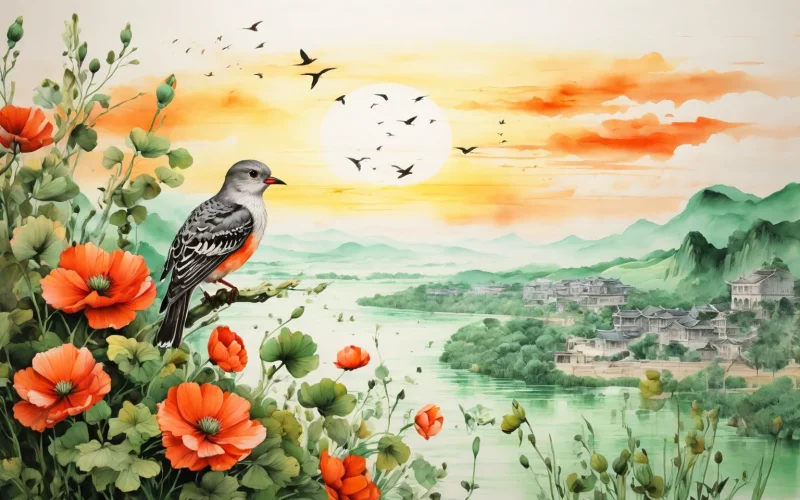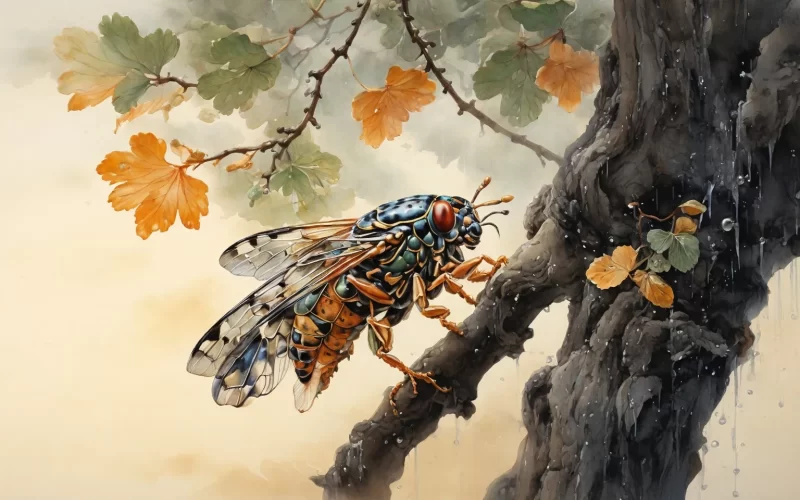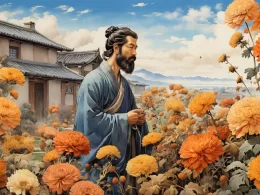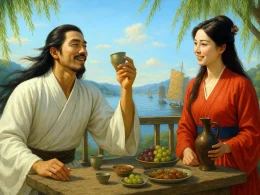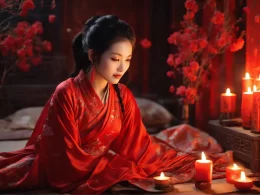Do not compare your leaves with tumbleweed in hue!
On Mountain-climbing Day our head's adorned with you.
When poolside shores are sweet with your blooms wet with dew,
None envy pine-like plants high on the eaves in view.
Original Poem:
「菊」
郑谷
王孙莫把比蓬蒿,九日枝枝近鬓毛。
露湿秋香满池岸,由来不羡瓦松高。
Interpretation
This poem was composed in the late Tang Dynasty and stands as one of Zheng Gu's representative works of object poetry. Though merely four lines, it is exquisitely conceived and rich in meaning. Through depicting the chrysanthemum's form and spirit, the poet expresses his noble aspirations and ideals of character, offering profound critique of vulgar aesthetics and utilitarian values, embodying the literati's unyielding and independent spirit.
First Couplet: "王孙莫把比蓬蒿,九日枝枝近鬓毛。"
Wáng sūn mò bǎ bǐ péng hāo, jiǔ rì zhī zhī jìn bìn máo.
Noble sons, mistake it not for common weeds—
On Double Ninth Day, each bloom graces the temples.
The opening line carries a satirical tone, using "noble sons" to represent the elite who fail to recognize the chrysanthemum's purity, confusing it with wild grass. The subsequent description of people adorning their hair with chrysanthemums during the Double Ninth Festival highlights how true beauty reveals itself in due time—implying that noble character, like the flower, gains recognition through circumstance.
Second Couplet: "露湿秋香满池岸,由来不羡瓦松高。"
Lù shī qiū xiāng mǎn chí àn, yóu lái bù xiàn wǎ sōng gāo.
Dew-drenched autumn fragrance fills the pond's shore;
Never has it envied the roof-pine's lofty height.
These lines engage sight and smell, painting the chrysanthemum's dewy morning splendor—its fragrance refreshing the senses. "Never envied the roof-pine" delivers the poem's core message: though the flower grows low and unassuming, it possesses innate nobility and fragrance. The roof-pine, thriving in elevated but dependent positions, serves as foil to the chrysanthemum's unpretentious dignity, symbolizing the poet's own integrity and self-reliance.
Holistic Appreciation
This quintessential object poem is concise yet profound. Beginning with society’s disregard for chrysanthemums, the poet reveals their true worth through seasonal beauty and lingering fragrance, culminating in the defiant line "Never envying roof-pine’s height"—forging an image of unyielding integrity. More than floral praise, it’s a manifesto of moral character. Without overt didacticism, every word resonates with symbolic depth, perfectly merging "object depiction" with "spiritual aspiration."
Artistic Merits
- Symbolic Embodiment
The chrysanthemum becomes a vessel for the poet’s uncompromising ideals. Contrasting "weeds" with "roof-pines", he exposes worldly superficiality while celebrating the flower’s quiet nobility—a masterclass in understated power. - Precision with Resonance
Twenty characters contain multitudes: each syllable polished to luminous density, epitomizing the Tang five-character jueju’s artistic zenith. - Realism Transcended
Chrysanthemums, pond banks, and morning dew feel tangibly real yet charged with meaning; "nobles" and "roof-pines" elevate the poem into a realm where scene and symbol, concrete and abstract, harmonize flawlessly.
Insights
Zheng Gu’s Chrysanthemum exalts not just natural beauty but the scholar’s ethos—unswayed by gain, unbent to power. In our clamorous age, it reminds us to cultivate inner clarity and steadfastness. As the poem declares: true nobility lies not in stature but in fragrant integrity—"Never envying roof-pine’s height."
Poem translator
Xu Yuanchong (许渊冲)
About the Poet
Zheng Gu (郑谷, c. 851–910), a native of Yichun, Jiangxi, was a Late Tang poet who earned the jinshi degree in 887. His style blended Wei Zhuang’s lyrical grace and Du Xunhe’s accessibility, bridging Late Tang and early Song poetry while influencing the Xianglian erotic tradition of the Five Dynasties.







